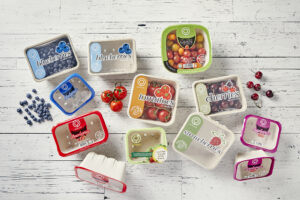Packaging trends address sustainability concerns
As sustainability becomes an increasingly prominent concern, industries around the world are striving to adopt eco-conscious practices.
Among these industries, produce manufacturers play a crucial role in addressing environmental challenges.

Consumers today are not only seeking high-quality produce but also are demanding sustainable packaging solutions.
Packaging trends
One of the key trends in sustainable produce packaging is the emphasis on reducing the environmental footprint by making thoughtful materials and packaging choices. Manufacturers are exploring alternatives to traditional packaging materials, such as plastics, which have significant environmental implications. Biodegradable and compostable materials, such as plant- based plastics and fiber-based packaging, are gaining traction as greener options. By prioritizing these materials, produce manufacturers can minimize waste and promote a circular economy.
While trends do indicate some transition from plastics to other materials, according to The Packaging Compass, jointly developed by PMMI, The Association for Packaging and Processing Technologies, and the American Institute for Packaging and the Environment (AMERIPEN), when queried about the type of materials used in their operations, 75% of consumer- packaged goods (CPG) respondents continue to use plastic. This statistic indicates that plastic is still a valuable material for packaging design.

Additionally, many survey participants indicated that within the next decade, they foresee a significant increase in using post-consumer recycled (PCR) content with their packaging. This aligns with an increase in state mandates for recycled content as well as voluntary goals set by individual CPG companies to increase recycled content in packaging 25% to 35% by 2025.
Another notable trend is the shift toward minimalist packaging designs. Consumers are increasingly drawn to produce that is presented in simple, uncluttered packaging. This trend aligns with sustainability goals by reducing material usage and waste generation. By opting for minimalistic packaging, manufacturers can communicate their commitment to sustainability and provide consumers with a greener choice. Additionally, streamlined packaging often enhances product visibility, allowing customers to make informed choices while reducing the need for excessive packaging.
Innovation solutions
In recent years, innovative packaging technologies have emerged as a game- changer for produce manufacturers in terms of sustainability. These technologies aim to extend the shelf life of fresh produce, reducing food waste and enhancing overall sustainability.
For instance, modified atmosphere packaging (MAP) techniques create an optimal gas composition within packages to slow down spoilage. Vacuum packaging and active packaging, which incorporates oxygen absorbers or moisture-control mechanisms, are also gaining popularity. By adopting these technologies, produce manufacturers can improve product quality, reduce waste, and enhance the overall sustainability of the supply chain.
Closing the loop on packaging is an essential aspect of sustainable practices. Increasingly, produce manufacturers are exploring reusable and returnable packaging solutions to minimize waste and promote a circular economy. Reusable crates, totes and containers are being implemented to replace single- use packaging, reducing the amount of material sent to landfills.
Additionally, innovative programs that allow customers to return packaging for reuse or recycling are being developed. By embracing these initiatives, produce manufacturers can create a more sustainable and closed-loop packaging system. The Packaging Compass report points to this increase in nontraditional materials and recovery systems to help increase the collection, sorting and processing of these emerging packages.
Education and awareness play a vital role in driving sustainable practices. Produce manufacturers are increasingly focusing on educating consumers about the importance of sustainable packaging and the role they can play in reducing environmental impact. Clear labeling, eco-friendly branding and transparent communication help consumers make informed choices and understand the sustainability benefits of certain packaging options.
Produce processors can source the latest sustainable solutions at PACK EXPO Las Vegas, Sept. 11-13. The new Sustainability Central and accompanying Sustainability Stage will serve as an interactive destination, which takes an expansive look into what sustainability means and provides manufacturing, materials, and design resources to make brands more sustainable.
In addition, PACK EXPO is committed to sustainability. Through targeted show features, increased recycling and improved processes on the show floor, PMMI, its partners, vendors and exhibitors are working together to create a more sustainable world. Look for exhibiting companies displaying the PACK EXPO Green logo, indicating they offer sustainable solutions, technology and innovations that reduce carbon footprint.
To register and learn more, visit packexpolasvegas.com.










